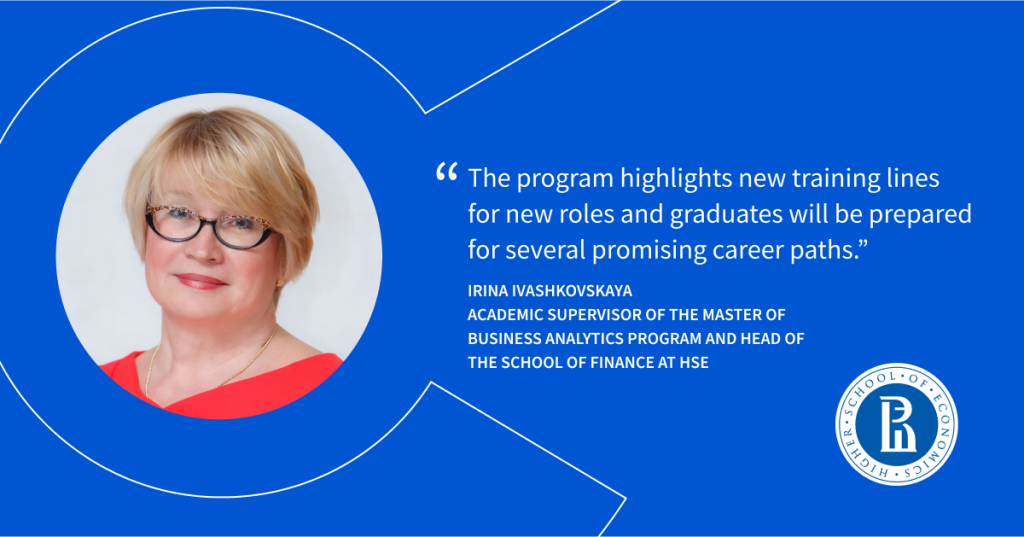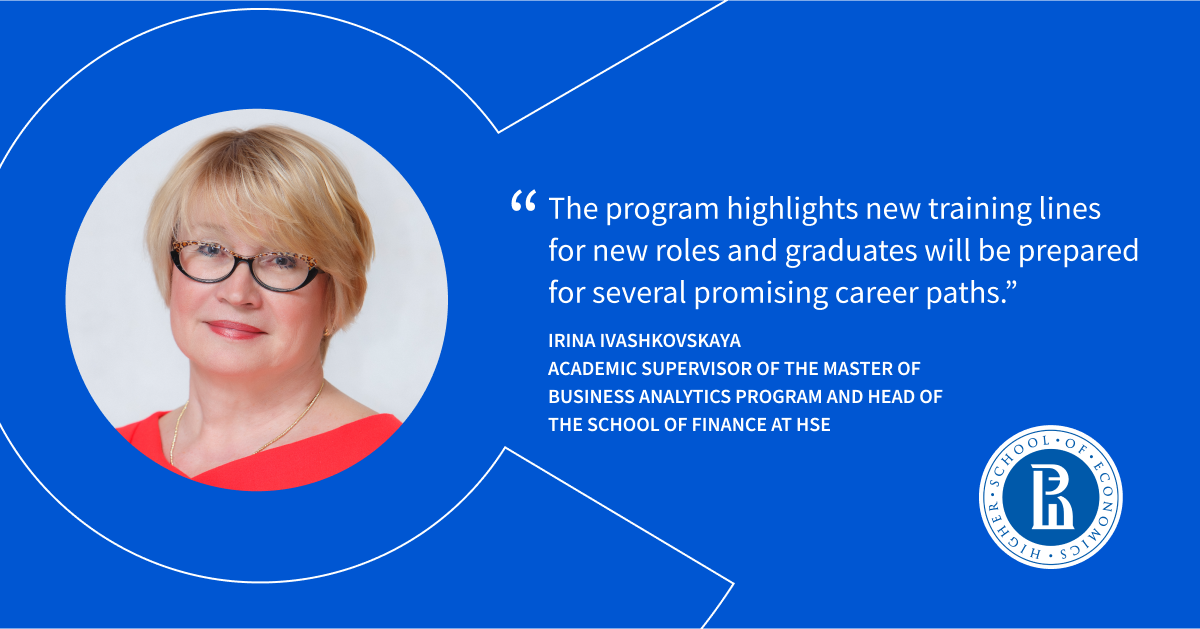
In the fall of 2021, the first enrollees in the Master of Business Analytics program from HSE will commence their studies on the Coursera platform. Students in this groundbreaking program will develop innovative new skills uniquely relevant to a rapidly evolving global business and financial landscape.
The program’s approach— implemented in cooperation with international professional networks such as ACCA, AICPA-CIMA, and IMA— is rooted in three core principles about the role of finance and business analytics:
- Finance should provide the measures for intellectual capital generated and accumulated by non-financial stakeholders.
- Finance should offer the pricing models for new risk drivers derived from companies’ intellectual and natural capital.
- Finance should play the role of integrator between non-financial and financial capitals and provide the models to secure the connectivity between non-financial capitals and future financial performance.
As the global market economy continues to be reshaped by new challenges, HSE recognizes that exciting new career opportunities are emerging in the wake of these disruptions. The program is structured in such a way that you can learn the most essential skills for success in these new roles. The program offers two specializations: Value-Based Business Analytics and Strategic Business Reporting. As you progress through the program, you’ll take a balance of compulsory and elective courses, engage in interactive Virtual Labs, and participate in project workshops where you’ll complete two real-world projects under the supervision of industry experts. Upon earning your degree, you’ll learn the skills needed to succeed in a range of positions. These include financial management roles, roles at investment banks or investment funds, positions within accounting departments, and consultancy roles.
We spoke recently with Professor Irina Ivashkovskaya, Head of the School of Finance at HSE and Academic Supervisor of the new Master of Business Analytics program. Over the course of our discussion, she offered her insights into the program’s focus, the new career opportunities she sees emerging in the fields of finance and business analytics, and the value of innovative new learning tools like Virtual Labs.
Professor Ivashkovskaya, thank you so much for taking the time to talk with us about this exciting new program. Let’s start with the basics; can you tell us a little bit about the focus of the program?
The Master of Business Analytics program is centered around developing new competencies for integrated thinking in analysis and decision-making, and connecting the measurement and evaluation of financial forms of capital (debt and equity) and non-financial capitals. Today, this kind of integration is becoming a core competence requirement for those who set out to join top management or boards of directors of companies, banks, or consultancy companies. It is no longer realistically possible to become successful in business and grow professionally without focusing on the integration of financial and multiple forms of non-financial capital. This entails the interests and benefits of not only investors and owners, but also non-financial stakeholders.
Given the program’s future-facing nature, what do you see as the points of connection between the “new” and the “old” in terms of how people should pursue career advancement?
Well, this master’s program is aimed at new groups of competencies in areas which, at first glance, actually do belong to traditional professional tracks, such as financial management, accounting, and reporting. The key difference is that the program highlights new training lines for new roles that correspond to new international practices. The result is that graduates will be prepared for several promising career paths.
Can you give us a specific example of one of these new career paths?
Let’s take financial management as an example. With financial management, the central challenge is to have a methodology for analysis that integrates financial and non-financial capital and aims to add value to the business, taking into account the interests of different stakeholder groups over the long term. In the near future, this will become the work of the Chief Value Officer (CVO)—a role that will ultimately replace the Chief Financial Officer (CFO). This professional trend will also require a new approach to budgeting and modeling in order to achieve sustainable company value in the long run.
You mentioned the transformation from CFO to CVO; are there other new roles you see emerging?
Yes, absolutely. Another new position that is taking shape is that of the ESG Director (Environmental, Social, and Governance). This is someone who can provide a new quality of management for the company’s different capitals to achieve specific environmental, social development, and board role targets.
If financial management is one of the main professional tracks where you’re seeing evolution and innovation, are there others?
Yes, I’d say a second area of change is related to accounting and reporting. Different forms of non-financial reporting are developing rapidly. It is not just a matter of adding more sections to a company’s current reporting. It’s about a new quality of reporting. Reporting needs to become holistic, integrating non-financial capitals, their risks, and their impact on financial results—both current and future.
A third area of change is innovation in risk management. New integrated risk management concepts and tools are being developed and modeling can now take into account risk factors hidden in non-financial capitals.
A final area where we see change is in compliance. Compliance is transforming from a static function of fixing right and wrong practices into a function of maximizing value for both investors and other stakeholders through best ethical business practices that meet ESG criteria. Compliance needs to focus not just on a company’s risks, but on long-term business value growth. It is a field that is increasingly connected to financial knowledge and skills.
We’ve talked at length about the changing landscape of finance and business analytics and the emerging professional tracks that students can pursue. Let’s switch our focus a bit and talk about the program itself. Specifically, can you tell us a little bit about Virtual Labs? What are they, and how do students benefit?
Virtual Labs are a new format that we created with international experts from Europe, the United States, and Asia. In live dialogues with students, these international experts can share their perspectives on emerging trends and provide insight into how they’re solving new business analytics challenges. We have also introduced project-based seminars in which international business experts representing the latest professional tracks in finance lead live virtual workshops. These experiences become tools that teams can use to organize their creative work on project topics within specializations.
It’s a great example of how an online learning platform can make new kinds of experiences possible.
Yes, the modern world is dictating new formats for delivering education. In an environment of uncertainty and multitasking, online education is becoming increasingly important. Fortunately, thanks to the “learn from anywhere with a flexible schedule” format and the well-established set of digital tools that Coursera offers, we’re able to provide students with innovative, world-class content via a platform that aligns with their lifestyles and goals. Just as the professional trends we’ve discussed represent the new mainstream for finance and business analytics, online is swiftly becoming an important tool for professional degree-level learning.
~
We’d like to thank Professor Irina Ivashkovskaya for sharing her perspectives and insights! Enrollment is now open for the Master of Business Analytics program from HSE University. HSE has long been one of the most prestigious universities in Russia, and in 2020, HSE earned the first place spot on Forbes’ Best Russian Universities list. Learn more today!
Check out the latest courses from Coursera

